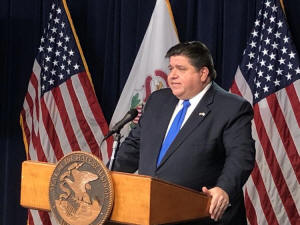New law incentivizes landlords to offer affordable housing
 Send a link to a friend
Send a link to a friend
 [September 03, 2021]
By Zeta Cross [September 03, 2021]
By Zeta Cross
(The Center Square) – Gov. J.B. Pritzker
has signed a landmark housing bill that incentivizes landlords to create
more affordable housing.
Bob Palmer, policy director of the advocacy group Housing Action, said
that developers and proponents of moderately-priced housing have worked
together for a long time to come up with the key provisions of House
Bill 2621.
The legislation passed both Houses of the Illinois legislature in May
with unanimous, bipartisan support.
“The idea is to support owners of rental housing who want to invest in
their properties and keep rents affordable,” Palmer said. “By reducing
the property taxes, you make it possible for people to charge affordable
rents.”
The incentives appealed to developer Related Midwest, the builder of a
new 300-unit building soon to break ground near Fulton Market. Related
President Curt Bailey told the Chicago Tribune that the new tax formula
will allow the company to reserve 60-units in the 43-story high rise for
low to moderate income families.

Under the law’s definition, an affordable apartment is one that a family
making 60% of the area’s median income can afford. In Chicago, a family
of four with a combined income of $54,500 a year, meets that
qualification. The family’s monthly gross income is $4,542.
Under the provisions of the bill, an affordable rent payment for the
family must be no higher than 30% of their monthly income, or $1,300 a
month.
Housing Action says that Illinois needs 108,000 more affordable housing
units in order to accommodate all the Illinois families who need them.
The need for low-income housing in Illinois is even greater, with about
270,000 units needed. The Illinois affordable housing shortfall means
that many low-to-moderate-income families are forced to pay as much as
50% or more of their monthly incomes for rent.
[to top of second column]
|

Gov. J.B. Pritzker speaks at a news conference at the Thompson
Center in Chicago on Monday, Nov. 30, 2020.
By Brett Rowland | The
Center Square

Palmer said most of the landlords who will take advantage of the new tax
incentives will not be big developers, but rather owners of existing
buildings that have seven units or more.
“When it comes to basic operating expenses, property taxes are a
significant piece for a building owner,” Palmer said.
Owners who charge their tenants more affordable rents cannot cover their
operating and maintenance expenses and pay their property taxes,
according to Palmer.
“It just doesn’t work," he said.
Illinois’ new housing bill will lower property tax assessments for
owners who charge affordable rents.
“When they need to finance major upgrades, such as roof or HVAC
replacement, or modifications to make a unit handicapped accessible,
assessed value reductions will make finding the financing much less
challenging,” Palmer said.
 |